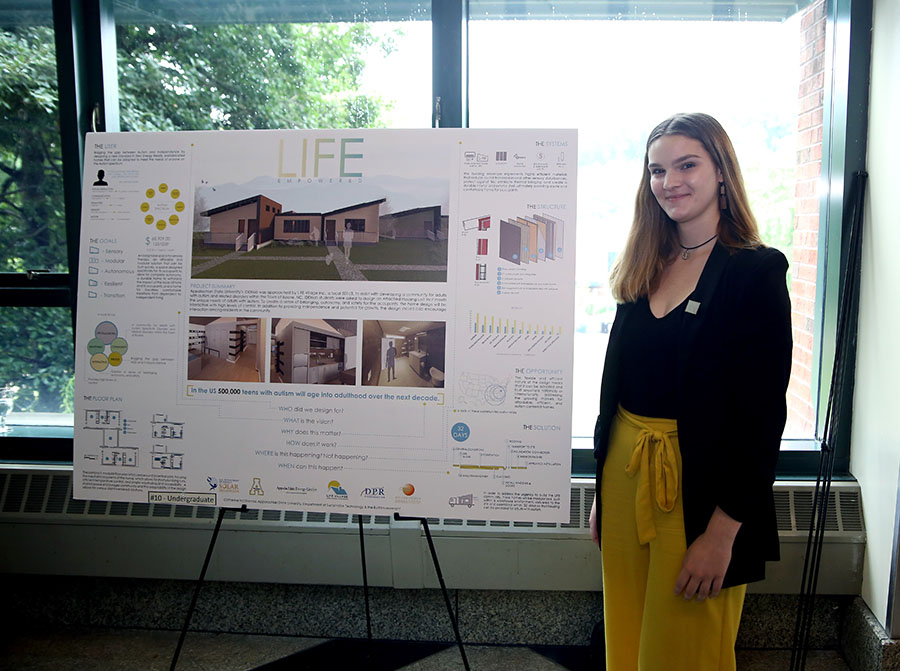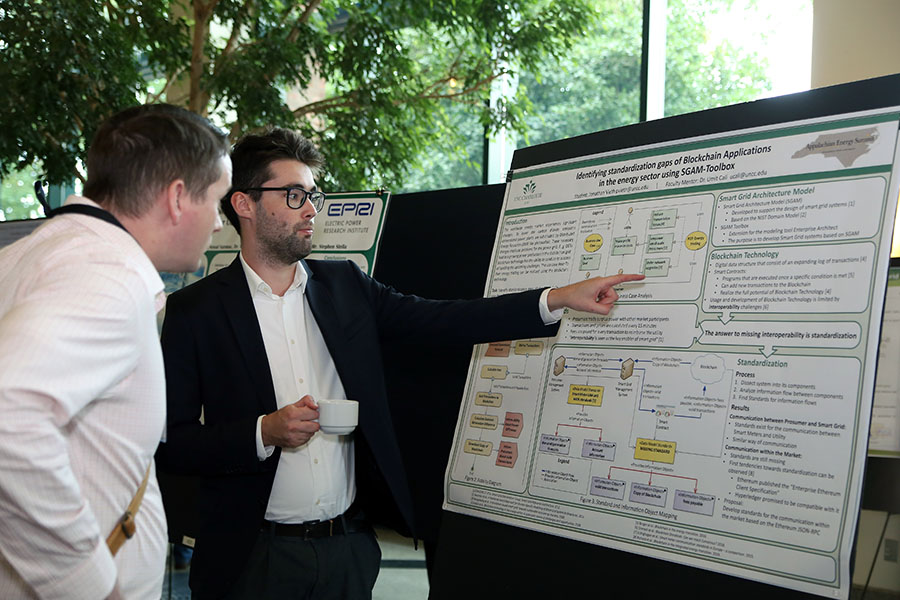BOONE, N.C. — Some of the world’s best minds in energy policy and practice convened on Appalachian State University’s campus last week for the eighth annual Appalachian Energy Summit, sharing knowledge, innovations and best practices.
The three-day event — with a theme of “Creating a Resilient Energy Future” — focused on the need for University of North Carolina System institutions and other state organizations to adapt to changing markets, weather patterns and technologies.
In her opening remarks at the summit, Appalachian Chancellor Sheri Everts reported that, to date, UNC System institutions, together with industry partners, have avoided more than $924 million in utility costs. The System is on track to avoid $1 billion in utility costs by 2020 and $2 billion by 2025.
Everts told the summit’s 330 registered attendees, “Together, you put into action a transformational effort that delivers real and powerful ecological, financial and social benefit to our state, our region and our world.”
“The UNC System has a demonstrated track record as a leader in energy efficiency,” said Dr. Lee Ball, Appalachian’s chief sustainability officer. “The UNC System has a responsibility to continue its leadership as we transition toward a more resilient and responsive energy infrastructure.”

Speakers featured in the Keynote Panel of the 2019 Appalachian Energy Summit engage in a discussion moderated by Dr. Jeff Ramsdell, professor in Appalachian’s Department of Sustainable Development and the Built Environment, far left. Others pictured, from left to right, are Energy Summit keynote speaker Amory Lovins, chief scientist at the Rocky Mountain Institute; Sushma Masemore, deputy assistant secretary for environment and state energy director in the NC DEQ; and N.C. Rep. John Szoka. Photo by Leila Jackson
Keynote speaker Amory Lovins, chief scientist at the Rocky Mountain Institute, focused his remarks on the need for implementation of energy efficiency and renewables strategies.
In his remarks, Lovins, who has been a featured speaker each year since the summit’s inception in 2012, explained that the electric power industry is changing to become customer-focused, renewable and resilient.
A Student Summit was held in conjunction with the Energy Summit, in which 80 undergraduate and graduate students had the opportunity to network with industry professionals and learn more about energy and sustainability in both the region and nation. The students also engaged in working groups on campus sustainability initiatives and careers in renewable energy.

Appalachian senior Catherine McDiarmid, an interior design major from Pittsboro, with the winning research poster in the undergraduate category of the Student Summit poster competition. McDiarmid completed the research with other building sciences students as part of a group project for local nonprofit LIFE Village Inc. Photo by Leila Jackson
As part of the Student Summit, students participated in a poster competition sponsored by the Appalachian Energy Center, presenting innovative ideas on topics related to clean energy. A total of 36 posters were submitted for judging.
The top prize in the competition’s undergraduate category was awarded to Appalachian building sciences students Catherine McDiarmid, Andrew Blount, Hunter Galliher ’19, Chad Hupp, Rachel Small ’19 and Annika Davidson for their poster titled “A New Approach to Adaptable, Energy Efficient Design for Individuals on the Autism Spectrum.”
Justin Krupa, of New Wilmington, Pennsylvania, received the top prize in the graduate category of the poster competition for his research on the “Use of Commercial Computational Fluid Dynamics Models to Assess HVAC Design Effects on Indoor Particle Behavior.”

Two attendees of Appalachian’s 2019 Energy Summit examine a research poster included in the poster competition of Appalachian’s Student Summit. The poster, titled “Identifying standardization gaps of Blockchain Applications in the energy sector using SGAM-Toolbox,” was completed by UNC Charlotte student Johnathon Vieth. Photo by Leila Jackson
Energy Summit attendees heard from a range of academic, corporate and government speakers, and had the opportunity during working groups and breaks to share knowledge and experience, as well as engage in collaborative work to further develop campus clean energy.
This year’s event featured over 15 guest speakers, including the following:
- Sushma Masemore, deputy assistant secretary for environment and state energy director in the North Carolina Department of Environmental Quality (NC DEQ).
- Dr. J. Todd Roberts, chancellor of the North Carolina School of Science and Mathematics.
- North Carolina Rep. John Szoka.
- Jeremy Tarr, policy adviser on energy, environment, transportation and natural resources in the North Carolina Office of the Governor.
- W. Scott Tew, executive director of Ingersoll Rand’s Center for Energy Efficiency and Sustainability.
What do you think?
Share your feedback on this story.
About Sustainability and Energy Management at App State
Appalachian State University’s leadership in sustainability is known nationally. The university’s holistic, three-branched approach considers sustainability economically, environmentally and equitably in relationship to the planet’s co-inhabitants. The university is an active steward of the state’s interconnected financial, cultural and natural resources and challenges students and others think critically and creatively about sustainability and what it means from the smallest individual action to the most broad-based applications. The university offers both undergraduate and graduate academic degree programs that focus on sustainability. In addition, 100 percent of Appalachian’s academic departments offer at least one sustainability course or course that includes sustainability, and all students graduate from programs that have adopted at least one sustainability learning outcome. Learn more at https://appstate.edu/sustainability.
About Appalachian State University
As a premier public institution, Appalachian State University prepares students to lead purposeful lives. App State is one of 17 campuses in the University of North Carolina System, with a national reputation for innovative teaching and opening access to a high-quality, cost-effective education. The university enrolls more than 21,000 students, has a low student-to-faculty ratio and offers more than 150 undergraduate and 80 graduate majors at its Boone and Hickory campuses and through App State Online. Learn more at https://www.appstate.edu.





![How NCInnovation Is Rethinking Economic Development in North Carolina [faculty featured]](/_images/_posts/2026/02/rethinking-economic-development-600x400.jpg)









